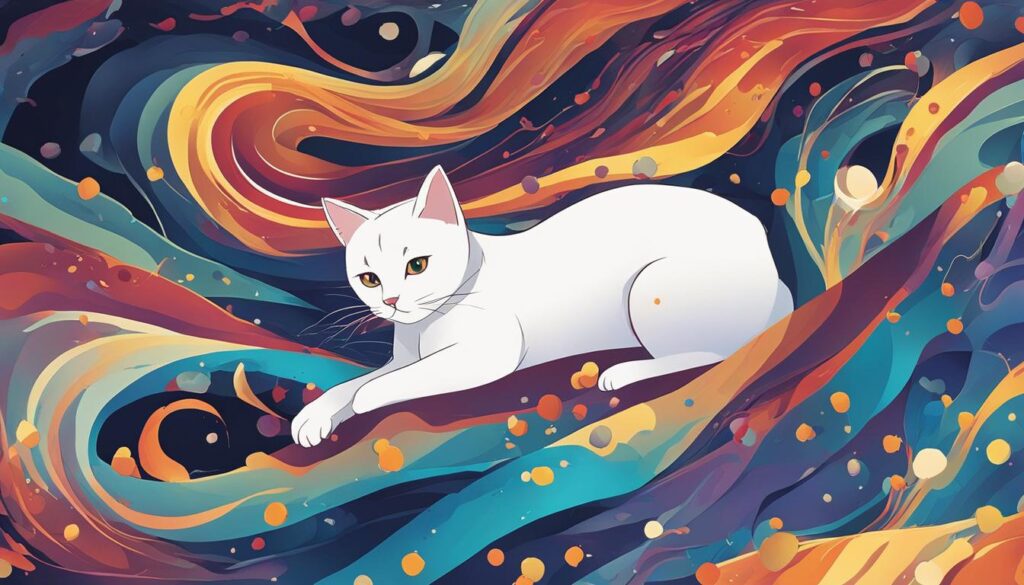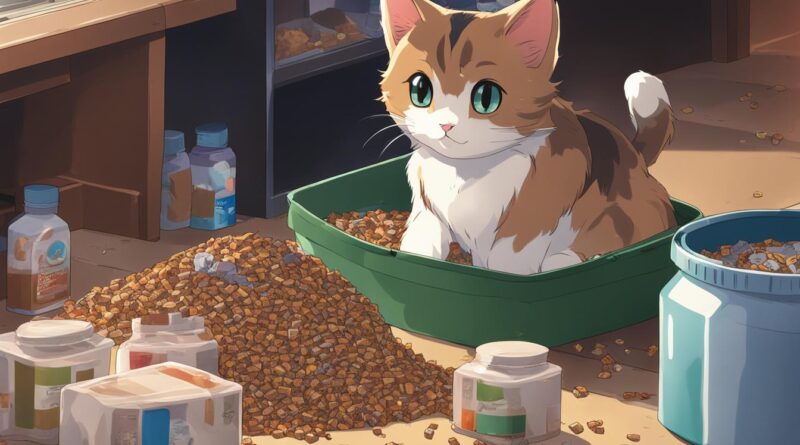Causes of Cat Diarrhea Explained
Cat diarrhea can be a distressing experience for both pets and pet owners. As cat lovers, we understand how important it is to keep our feline companions happy and healthy. That’s why we want to explore the reasons behind cat bowel irregularities and familiarize you with the common factors leading to cat loose stool.
Understanding what causes diarrhea in cats can give you valuable insights into providing the best possible care for your pet. In this section, we will discuss the common triggers of feline diarrhea and the reasons behind cat bowel irregularities. By identifying these factors, you can take proactive steps to keep your cat’s digestive system healthy and prevent diarrhea.
Key Takeaways:
- Cat diarrhea can indicate an underlying health issue.
- Understanding the causes of cat diarrhea is crucial for maintaining your pet’s well-being.
- Common triggers of feline diarrhea include gastrointestinal issues, viral and bacterial infections, and parasites.
- Identifying the root cause of cat diarrhea can help you take proactive measures to prevent it.
Gastrointestinal Issues in Cats
As responsible pet owners, we all want our feline companions to be healthy and happy. One common issue that cats face is gastrointestinal problems, which can lead to diarrhea and other digestive troubles. Identifying the causes of these problems is crucial to maintaining your cat’s health and wellbeing.
Dietary causes are a common trigger for cat diarrhea. Cats are obligate carnivores, which means that their diets should consist mostly of protein and fats, and very little carbohydrates. Feeding your cat a diet that is too high in carbohydrates can upset their digestive system and lead to diarrhea.
Another thing to consider is the quality of your cat’s food. Poor quality or cheap cat food can be packed with fillers, artificial preservatives, and other ingredients that can irritate your feline’s digestive system.
When choosing your cat’s food, it is important to read the label and ensure that the ingredients are high-quality and appropriate for your cat’s needs. Some cats may also have food allergies or sensitivities that can cause gastrointestinal problems, so it may be necessary to try different types of food to find what works best for your furry friend.
Key Takeaways:
- Gastrointestinal issues are a common cause of cat diarrhea.
- Dietary causes, including a high-carbohydrate diet and poor quality food, can contribute to these issues.
- It is important to choose high-quality food and consider your cat’s individual needs.
By being aware of these factors and taking steps to address them, you can help prevent gastrointestinal issues and keep your cat healthy and happy.
Viral and Bacterial Causes of Feline Diarrhea
Viral and bacterial infections are among the most common reasons behind feline diarrhea. These infections can arise from various sources, including contaminated food or water, contact with infected animals, or a weakened immune system.
Most common viral infections causing feline diarrhea are:
| Virus Name | Symptoms |
|---|---|
| Feline Calicivirus (FCV) | Runny nose and eyes, ulcers in the mouth, fever, lack of appetite, and vomiting |
| Feline Panleukopenia Virus (FPV) | Fever, depression, loss of appetite, vomiting, and dehydration |

The most common bacterial infections causing feline diarrhea include:
| Bacteria Name | Symptoms |
|---|---|
| Clostridium perfringens | Severe diarrhea, accompanied by vomiting, abdominal cramps, and fever |
| Salmonella | Diarrhea, vomiting, fever, abdominal cramps, and dehydration |
Preventing and Treating Viral and Bacterial Infections
Preventing viral and bacterial infections in cats involves maintaining good hygiene practices and keeping your cat’s environment clean. It is necessary to avoid feeding your cat raw food and prevent them from coming into contact with contaminated objects or sick animals.
If your cat is diagnosed with a viral or bacterial infection, your veterinarian may prescribe medication or recommend dietary changes and a rehydration plan. Timely treatment and proper care can help your cat recover from the infection and reduce the risk of complications.
Parasites and Cat Loose Stool
As responsible cat owners, it’s essential to pay attention to your cat’s digestive system to keep them healthy. Parasites are a common cause of cat diarrhea, and it’s crucial to prevent and treat any infestations promptly.
There are various parasites that can affect cats, including:
| Parasite Type | Symptoms |
|---|---|
| Roundworms | Vomiting, dull coat, bloated stomach, and diarrhea. |
| Tapeworms | Weight loss, vomiting, and diarrhea. You may also notice segments of the tapeworm in your cat’s stool. |
| Coccidia | Diarrhea, fever, dehydration, and loss of appetite. |
| Giardia | Diarrhea, vomiting, weight loss, and lethargy. |
Parasites can cause intestinal inflammation, leading to diarrhea and other gastrointestinal issues. To prevent infestations, it’s vital to keep your cat’s living spaces clean and maintaining proper hygiene. Avoid feeding your cat raw or undercooked meat and provide clean drinking water at all times.
If your cat develops a parasite infestation, consult your veterinarian for the correct diagnosis and treatment. Proper medication will help eliminate the parasites and alleviate your cat’s diarrhea.
In the next section, we’ll discuss the conclusion of the article and summarize the common triggers behind cat diarrhea.
Conclusion
So now we know the common triggers behind why cats may experience diarrhea. Gastrointestinal issues, viral infections, bacterial causes, and parasites are all factors that can contribute to cat loose stool. By identifying these causes, we can take proactive measures to prevent and address diarrhea in our feline companions.
Remember, maintaining your cat’s digestive system health is essential for their overall well-being. Always consult a veterinarian if you suspect your cat is experiencing diarrhea or any other health issues. With proper care and attention, you can help ensure your cat remains happy and healthy for years to come.
Thank you for reading our article on the causes of cat diarrhea. We hope you found it informative and helpful in caring for your furry friend.
FAQ
What are the common triggers of feline diarrhea?
Common triggers of feline diarrhea include dietary changes, food intolerance or allergies, viral or bacterial infections, parasites, stress, and certain medications.
What are the reasons behind cat bowel irregularities?
Cat bowel irregularities can be caused by various factors, including dietary issues, infections, inflammation, intestinal parasites, and underlying health conditions.
What causes diarrhea in cats?
Diarrhea in cats can be caused by numerous factors, such as dietary changes or indiscretions, viral or bacterial infections, parasites, food allergies or intolerances, and stress.
What are the common factors leading to cat loose stool?
Common factors that can lead to cat loose stool include changes in diet, viral or bacterial infections, food allergies or intolerances, stress, parasites, and certain medications.
How do gastrointestinal issues contribute to cat diarrhea?
Gastrointestinal issues such as food sensitivities, inflammatory bowel disease, or pancreatitis can disrupt the normal functioning of a cat’s digestive system, leading to diarrhea as a symptom.
What are the dietary causes of cat diarrhea?
Dietary causes of cat diarrhea can include abrupt changes in diet, consumption of spoiled or contaminated food, food allergies or intolerances, or excessive fat content in the diet.
How do viral infections contribute to feline diarrhea?
Viral infections such as feline panleukopenia or feline coronavirus can damage the intestinal lining, leading to inflammation and diarrhea in cats.
What are the bacterial causes of feline diarrhea?
Bacterial causes of feline diarrhea can include infections from bacteria such as Salmonella, Campylobacter, or Escherichia coli (E. coli), often transmitted through contaminated food or water.
How do parasites contribute to cat loose stool?
Parasites like roundworms, hookworms, or coccidia can cause diarrhea in cats by damaging the intestinal lining or competing for nutrients, leading to gastrointestinal upset and loose stools.

